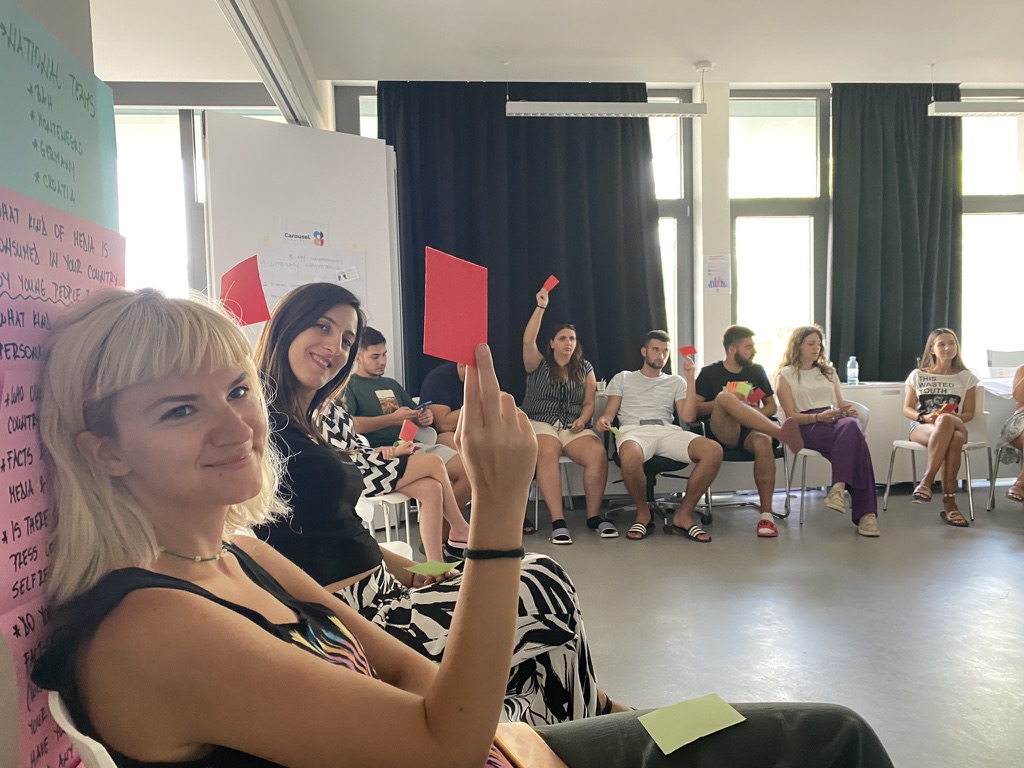
In order for those affected by a decision to be able to participate, democratic institutes of governance of different systems are being developed.
This also applies to topics that are important to young people.
We understand the participation of young people as an important contribution:
- to the development of skills and knowledge of young people and youth organisations in the field of democratic decision-making processes
- that decision-makers understand young people and give them the opportunity to create better policies
- to visibility and positive public image of young people
- to the development of concrete policies for young people.
Participation can also result in many positive implications in the lives of young people. It contributes to the development of their personality, their inclusion in society and their ability to face the challenges and pressures of youth.
Participation comes from the Latin word “participare”, which means both to participate and to share, to be involved, as well as to share something.
Young people participate at all levels, from local to global, from informal settings such as groups, networks and communities, to formal structures such as youth organisations, municipal youth councils, student councils, and elections.
In Croatia, there are the following forms of youth participation:
- Youth Council of the Government of the Republic of Croatia
- Youth councils in the local municipality
- Student councils in schools
- National Council of Students of the Republic of Croatia
- Children’s forums organised by the society Naša djeca
National Student Council:
- prepares and makes proposals to the Ministry on issues important to students, their work and results in education,
- proposes measures to improve (conditions of) work in schools,
- helps students in fulfilling school, extracurricular and other obligations,
- promotes the interests of students with special needs and seeks solutions to the problems they face on a daily basis,
- promotes sportsmanship and the fight against all kinds of addictions among students,
- encourages and nurtures a culture of dialogue and tolerance among students with regard to national, racial and religious diversity,
- develops the cooperation of primary and secondary school students with students in other countries,
- promotes innovation and research spirit among students,
- helps in building personality and strengthening the identity of students.
Sources:
Babić, D., Bojić, M., Bužinkić, E., Glišić, V., Horvat, M. Učenička vijeća, Sudjelovanje učenika/ica u procesima donošenja odluka. Zagreb, Croatia. Mreža mladih Hrvatske. Retrieved from: https://www.mmh.hr/uploads/publication/pdf/17/Učenička_vijeća_-_Sudjelovanje_učenikaica_u_procesima_donošenja_odluka.pdf
Sočo, A. 2011. Mladi: Priprema, pozor, sudjelujte! Sudjelovanje mladih – modeli, mehanizmi, praksa. Zagreb, Croatia. Mreža mladih Hrvatske. Retrieved from: https://www.mmh.hr/uploads/publication/pdf/22/Mladi_priprema__pozor__sudjelujte__-_Sudjelovanje_mladih___modeli__mehanizmi__praksa.pdf
Šalaj, B., Hoffmann, D. & Horvat. M. 2018. Edukacija za građansku pismenost Gonga: Politička pismenost, Zagreb, Croatia. Retrieved from: https://gong.hr/wp-content/uploads/2021/05/PolitickaPismenostprirucnik_revizija.pdf